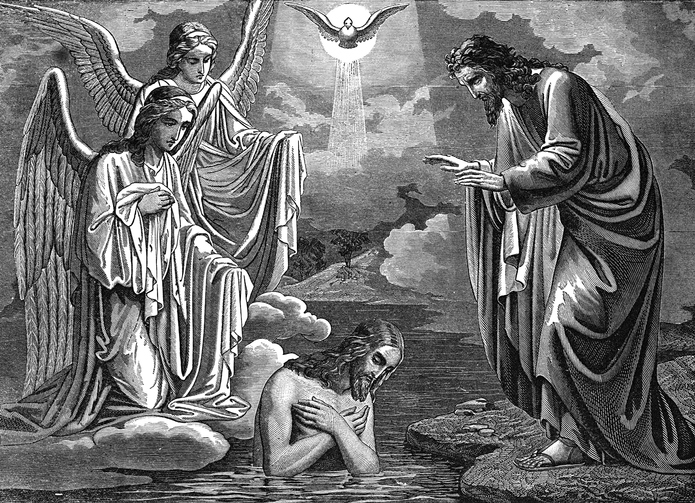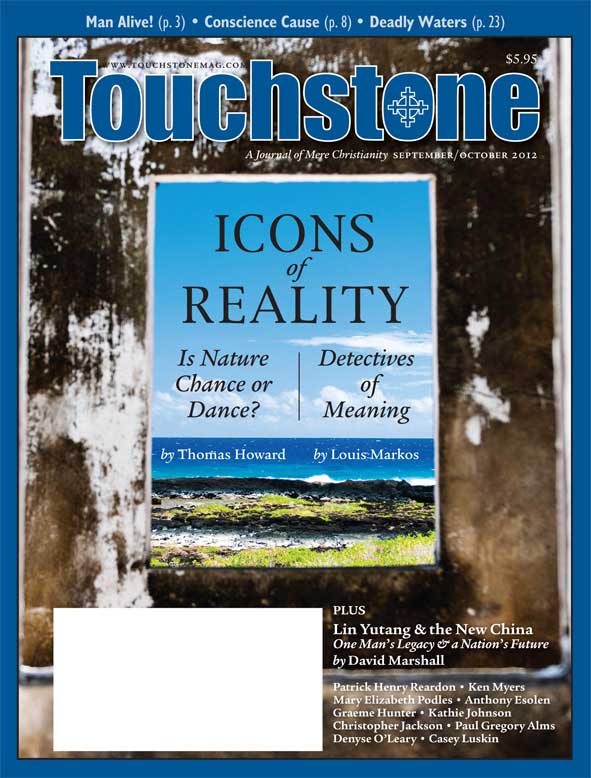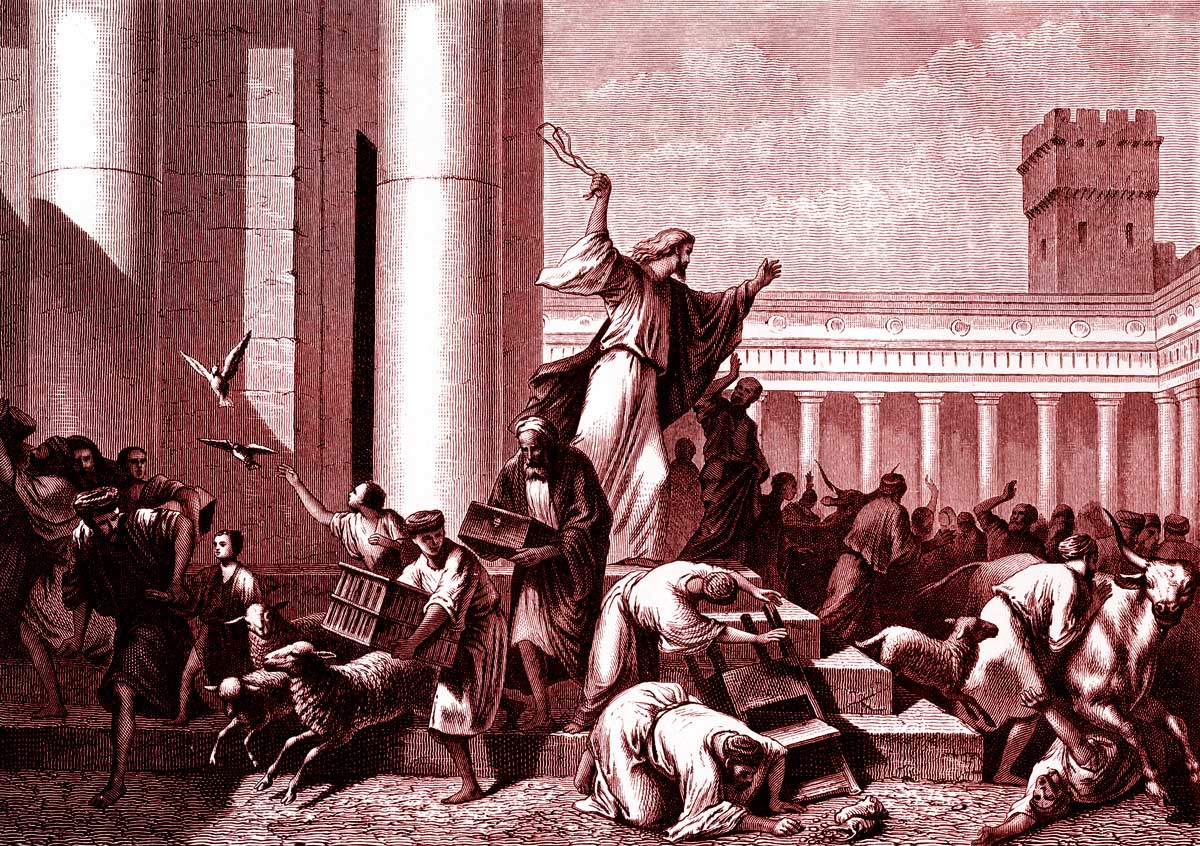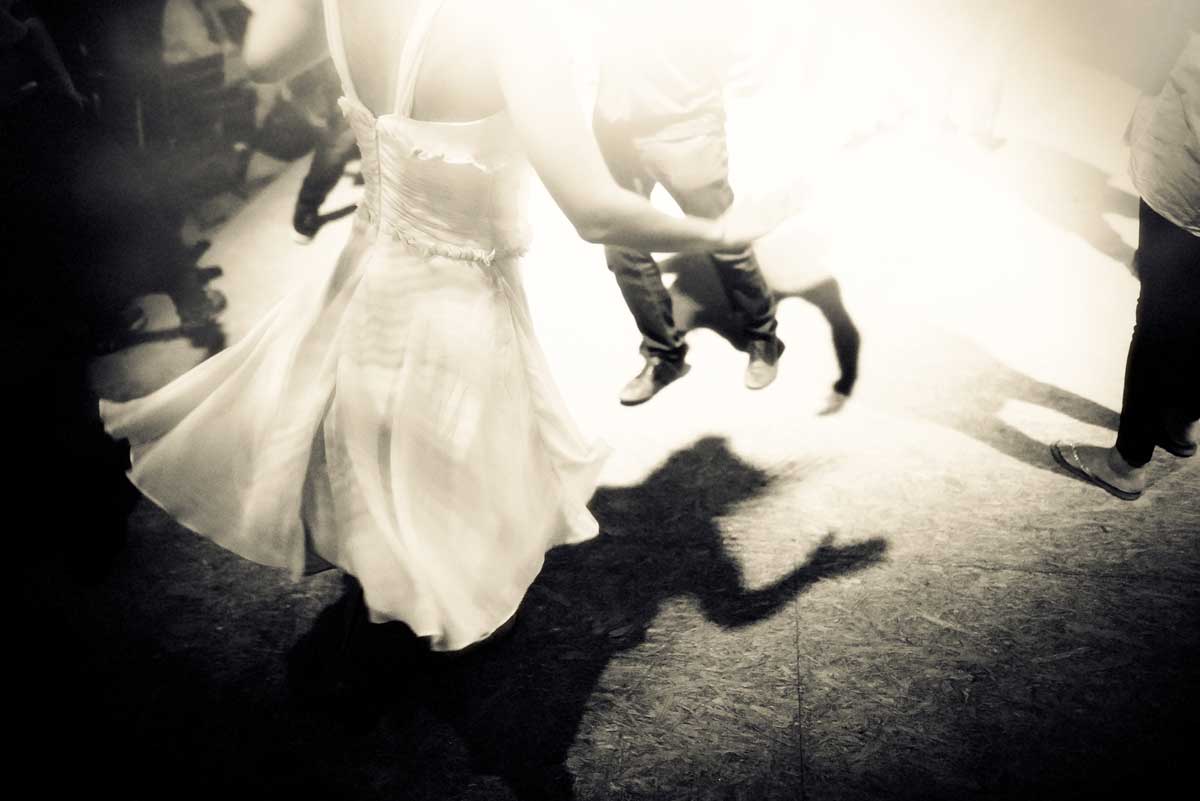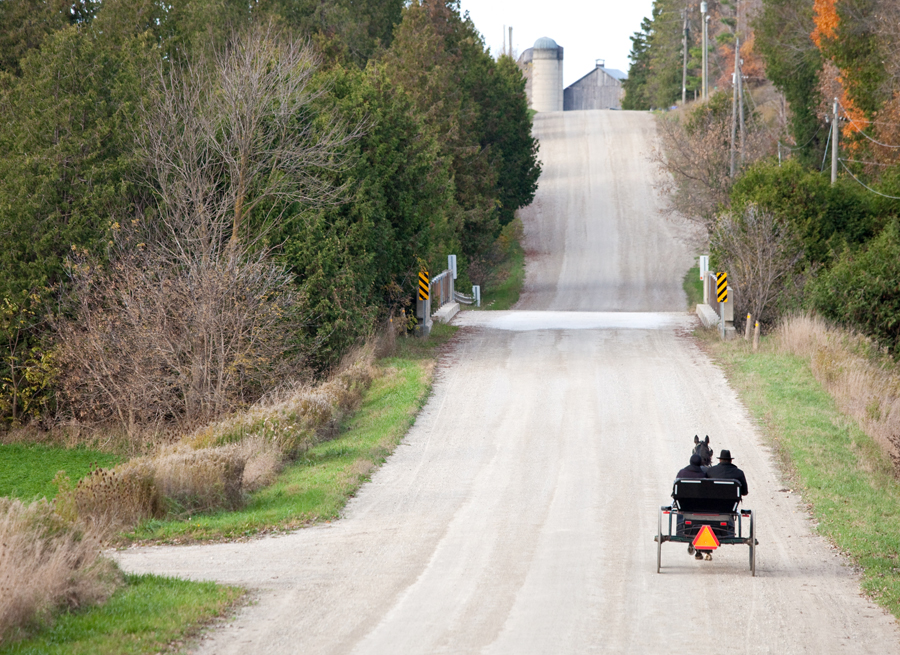View
Unsafe Sacrament
Paul Gregory Alms on Death in Baptism as a Necessary Prerequisite to Resurrection
Water means danger and death. At least in the Bible it does. Water in the Scriptures is often a thing of great peril, even an enemy of God. It is the deep, the sea, the raging storm, the waves that imperil the ordered creation. The Psalmist says that the floods lift up as in rebellion. They lift up their voice and their roaring (Ps. 93:3). The seas must be rebuked by the Lord's mighty word. Only he can shut in the sea (Job 38:8). He must keep the sea in its limits. The seas and the deep have great power and fury.
This rage threatens to overcome God's people. The deep is filled with chaos and disorder. Water can stand for death itself. Psalm 18 pictures the terrors of the grave as a great, overwhelming flood: "The cords of death encompassed me; the torrents of destruction assailed me; the cords of Sheol entangled me; the snares of death confronted me" (18:4–5). In Psalm 69, David cries out "Save me, O God! For the waters have come up to my neck. I sink in deep mire, where there is no foothold; I have come into deep waters, and the flood sweeps over me" (69:1–2). But for the Lord, "the flood would have swept us away, the torrent would have gone over us" (Ps. 124:4). The Psalmist begs for rescue "from the many waters" (Psalm 144:7).
Water is also an instrument of punishment and wrath in the hand of God. The great flood of Genesis is the prime example of God using water as an instrument of his anger. Later, the rebellious and grumbling Israelites went down into the midst of the terrifying Red Sea, which was held in check only by God's powerful mercy. The Lord gains victory by using the death-dealing waters of the Red Sea to judge and destroy the Egyptians.

A Fight Through the Depths
To be baptized is to be plunged into all this chaos, disorder, wrath, danger, and death. In other words, baptism is dangerous and deadly water. Yet we do not often think of it that way. What could be ominous about a sweet little baby, a few drops of water, and shiny-white new clothing? But when we look at baptism in terms of the larger scriptural picture of water and the Word and God at work, it begins to stand out as a much more serious matter. To be baptized is to be plunged into the water in accordance with God's command. But being plunged into the water, or as the Psalms might put it, to be cast into the raging deep, is not a gentle or serene affair.
When John the Baptist called people to repentance and confession of sins, he called them to go down into the water. To go down into the water is itself a confession of sins, an act of accepting the verdict for sins. It is to surrender to the flood, to allow oneself to be deluged and judged. To be baptized is to say with the Psalms that the deep waters and the pit and the mire are sweeping over us, that we ourselves have a spot under the wrathful waters of the flood, that our lives are instruments of chaos and disorder. It is to say that we are orphaned under the waves.
Thus, in the biblical way of seeing things, baptism is not a nice warm bath that easily washes away our sins. It is more a life-and-death battle with the deep, with real and persistent evil and the satanic forces that rule our hearts.
Water brings death. To be under the water is to die, to drown, and it is an ugly death—a thrashing, painful, grasping struggle as one sinks to the bottom. That is a part of the biblical portrait of baptism: to die in the water. Romans 6 says we are baptized into the death of Christ.
Jonah is thrown into the water and is saved, but he must first face death. He must face the darkness of the eternal depths before the great fish that swallowed him spits him back into life. Noah's ark was cast upon the seas of death, and Noah was closed in and waited for the Lord to remember him. It is from the watery depths of certain death that the Psalmist cries out for mercy. The Israelites walk through the same valley of the shadow of death as the Egyptians. We are baptized, says St. Paul, into the death of Christ, buried with him (Rom. 6:3–4).
Even the imagery Jesus uses in John 3 in connection with baptism, to be "born again," ought to evoke the powerful, intense, and, yes, watery experience of childbirth. A baby emerges from the womb when the mother's "water breaks." Birth is a struggle through water to emerge into life. A mother engages in a fierce and awful toil to give birth. Thus, to be born again is not a beatific, spiritual experience; it is a fight through the depths to bring to life a creature who has been dead in sin.
"Lord, Save Me"
At the center of biblical baptism, of course, is the death and resurrection of Christ. St. Paul says we are joined in a watery burial and union with Christ. To go down into the waters of baptism is to join Christ in his death. Christ's cross is his baptism unto death. St. Luke sees Christ's cross and resurrection as a baptismal event. When Christ endured his crucifixion, death, and burial, he went down into the flood, into the Red Sea, into the deep and angry waters of sin and dereliction. The cords of death entangled Jesus on the cross and in the tomb; he drowned outside the ark in the deluge of God's anger over sin. When we meet the waters of baptism, we must join him there. We must die with Christ.
In one of the great baptismal scenes of the New Testament, we see the contrast between an entry into the Christian life that appears painless and miraculous and an entry that involves death with Christ in the waves. It is the story of Peter walking on the water. Peter sees Christ striding over the deep and gets the idea to do it himself. Calling on Jesus to enable him to follow, he steps out of the boat.
And he does walk on the waves. Peter is walking on the water, upright, proud, connected to Jesus. But the stormy deep claims her own. Peter must be swallowed by the water before he can truly follow Christ. He begins to sink. His baptism has begun. His false pride is drowned. Peter cries out, "Save me, Lord."
Here is baptism. Man's foolish pride is extinguished in the water; the inexorable pull of death grabs at and claims its own; and the pitiful confession is forced out of lungs now filling with the waters of judgment: "Lord, save me."
The Baptismal Victory
And the Lord does save in the water. "Baptism now saves you," says St. Peter in his epistle (1 Pet. 3:21). The waters that kill are also the instrument whereby God gives life. Jesus extends his hand and pulls Peter out of the Sea of Galilee onto the boat with the rest of the disciples.
David, who cried out that the deep mire was claiming him, sings out later in the same Psalm, "Let your salvation, O God, set me on high" (69:29). The Red Sea, which slaughtered the Egyptians, was the scene of God's great rescue of his people. "Your way was through the sea, your path through the great waters. . . . You led your people like a flock by the hand of Moses and Aaron" (Psalm 77:19–20).
The stormy deep must do God's saving will. The Psalmist confesses that though they are terrifying and great, when they saw "you, O God, when the waters saw you, they were afraid; indeed, the deep trembled" (77:16). The power of the Lord God cannot be overcome by the waves. The Creator who shuts in the sea with doors channels the fury of the sea to give life, to save.
But it is not mere power that God employs in baptism; it is crucified and resurrected power. Christ's resurrection is the great moment of baptismal victory. The watery deeps of death cannot hold Christ. According to the Gospel of Luke (9:31), Christ's passion and resurrection are his "exodus," his Red Sea victory over the Egyptians of sin and death. Christ is the greater Jonah. He emerges from the tomb as from his baptism in the Jordan, vindicated. He is God's beloved Son, and as in the great icons of the Resurrection in the Eastern Church, he grabs Adam and Eve and their children and pulls them from the icy blackness of death to new life on the shores of the Church.
The Baptismal Journey
The Body of Christ participates through baptism in the Passion of Jesus. This is why the Great Triduum of the early Church was, most of all, baptismal. While tracing the experience of Jesus, the Church traced her own baptismal journey—dying to sin and then rising with her Savior on Easter dawn.
To be baptized is to be crucified with Christ, to drown with him, and then to emerge like Jonah fresh on the beach. Here the Psalms return to our mouths with all their Christological and baptismal force. "He drew me up from the pit of destruction, out of the miry bog, and set my feet upon a rock. He put a new song in my mouth, a song of praise to our God" (Psalm 40:2–3). We look back at our Red Sea tomb, see the Egyptians dead on the shore, and sing the song of Moses: "I will sing to the Lord, for he has triumphed gloriously; the horse and his rider he has thrown into the sea" (Ex. 15:1).
The danger and deadly nature of the waters, however, do not cease with the moment of baptism. In his Small Catechism, Martin Luther sees Romans 6 primarily as a text concerning our ongoing baptismal life, not simply the moment of baptism itself. For Luther, being baptized into Christ's death and resurrection means that "the Old Adam in us should by daily contrition and repentance be drowned and die with all sins and evil desires and that a new man should daily emerge and arise to live before God in righteousness and purity forever."
Christian life is nothing other than a daily encounter with the waters of baptismal death, which are also the waters of repentance and resurrection and rebirth. The stormy deep claims us every day. The drowning is daily. We must daily walk through the Red Sea, constantly ride the ark over the terrifying flood, sink with Peter and call out, "Save me, Lord."
Water of Life
Water kills. Water makes alive. Finally, the stormy deep will give way to the streams of living water to which Christ will guide his people. If baptism is the water included in God's command and combined with God's word, that word must also include the shout Christ gives to the storm which threatens the ark of the Church: "Peace, be still"(Mark 4: 39). The unruly seas have, in the words of Luther, been "consecrated and set apart as a salutary flood and rich and full washing away of sins" (Baptismal Prayer).
The Lord God, the Creator made flesh, is Lord over his creation and bends even the murderous waves to bless his children. In the age to come, water will only be the water of life for the thirsty, and the Good Shepherd will lead his people beside the still water. For the baptized, there is a river whose streams make glad the city of God. That river is baptism. •
Paul Gregory Alms (paulgregoryalms.blogspot.com) is pastor of Redeemer Lutheran Church (LCMS) in Catawba, North Carolina. He is a graduate of Concordia Theological Seminary in Fort Wayne, Indiana, with both MDiv and STM degrees. He has written extensively for journals such as First Things, Concordia Theological Journal, Lutheran Witness, Lutheran Forum, The Cresset, and others. He is married and the father of four girls.
subscription options
Order
Print/Online Subscription

Get six issues (one year) of Touchstone PLUS full online access including pdf downloads for only $39.95. That's only $3.34 per month!
Order
Online Only
Subscription

Get a one-year full-access subscription to the Touchstone online archives for only $19.95. That's only $1.66 per month!
bulk subscriptions
Order Touchstone subscriptions in bulk and save $10 per sub! Each subscription includes 6 issues of Touchstone plus full online access to touchstonemag.com—including archives, videos, and pdf downloads of recent issues for only $29.95 each! Great for churches or study groups.
Transactions will be processed on a secure server.
more on christianity from the online archives
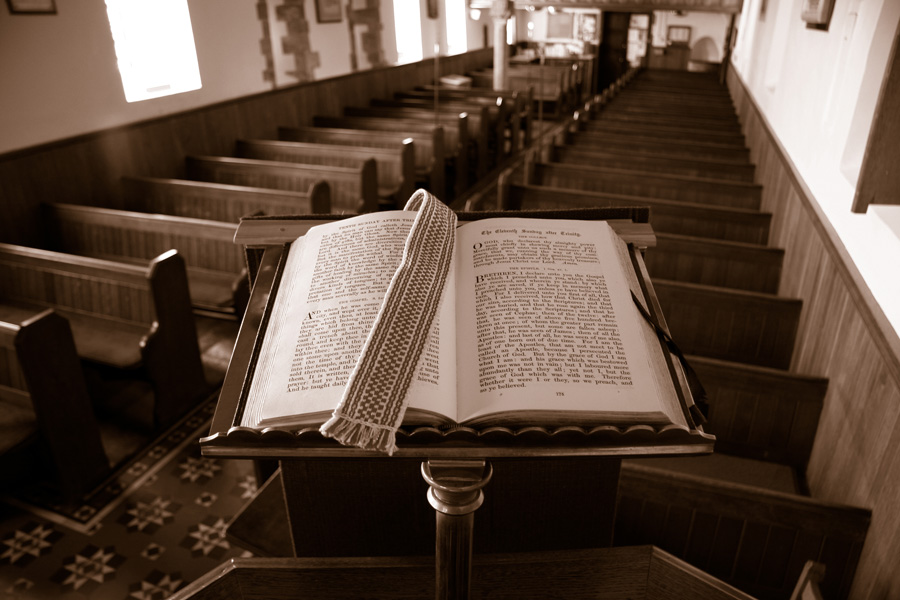
8.4—Fall 1995
The Demise of Biblical Preaching
Distortions of the Gospel and its Recovery by Donald G. Bloesch
more from the online archives
calling all readers
Please Donate
"There are magazines worth reading but few worth saving . . . Touchstone is just such a magazine."
—Alice von Hildebrand
"Here we do not concede one square millimeter of territory to falsehood, folly, contemporary sentimentality, or fashion. We speak the truth, and let God be our judge. . . . Touchstone is the one committedly Christian conservative journal."
—Anthony Esolen, Touchstone senior editor





